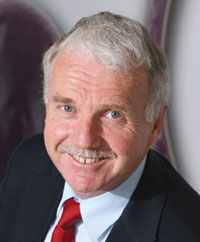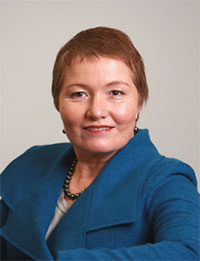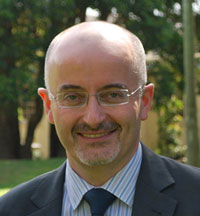Fraud measures
In 2015–16, the ARC:
- undertook fraud risk assessments
- reviewed and updated its fraud control plan to align with the Commonwealth Fraud Control Framework
- provided fraud awareness training for all staff
- provided regular updates to the ARC Audit Committee on fraud-related matters.
The Accountable Authority’s certification about the ARC’s measures for preventing, detecting, investigating and recording fraud is provided in the letter of transmittal (page iii).
Corporate governance structures and processes
Executive and senior staff
At 30 June 2016, the ARC had seven executive staff: the Chief Executive Officer (CEO); Executive General Manager (EGM); Branch Manager, Policy and Strategy Branch; and four Executive Directors. Executive Directors are academics drawn from the higher education and research sectors usually for a period of between three and five years.
In addition to the executive staff, the ARC had three senior staff at 30 June 2016: Dr Laura Dan, Chief Programme Officer; Ms Julija Deleva, Chief Financial Officer; and Ms Trish Leahey, Chief Information Officer.
Responsibilities

Professor Aidan Byrne, CEO
The ARC CEO has statutory responsibilities for managing and leading the agency in accordance with the requirements of relevant legislation.
Under the Australian Research Council Act 2001 (ARC Act) the CEO must: make recommendations to the Minister in relation to which proposals should be approved for funding; administer the financial assistance for research provided through the NCGP; provide advice to the Minister on research matters; and any other functions conferred on the CEO by the ARC Act or any other Act.
Professor Aidan Byrne was ARC CEO for the entire period of this report. On 24 May 2016 Professor Byrne announced he would be leaving the ARC in the last quarter of 2016.

Ms Leanne Harvey, EGM
Ms Harvey is responsible for the Research Excellence Branch and the Corporate Services Branch. The Research Excellence Branch comprises three sections with responsibility for managing Excellence in Research for Australia (ERA), developing an engagement and impact assessment framework and undertaking evaluations of NCGP funding schemes. The Corporate Services Branch comprises four sections with responsibility for financial management; legal services; people and services (including property and facilities management); and corporate communications and parliamentary and ministerial liaison.

Ms Kylie Emery, Branch Manager, Policy and Strategy Branch
Ms Emery is responsible for the Policy and Strategy Branch. The Branch comprises two sections with responsibility for the development of policy advice in relation to the NCGP; coordination of the ARC’s planning and reporting responsibilities; NCGP data analysis; the ARC Advisory Council; research integrity; the ARC Audit Committee; and coordination of internal audit and risk management activities.

Professor Clive Baldock, Executive Director, Engineering, Mathematics and Information Sciences
Professor Baldock, who joined the ARC in October 2015, is responsible for discipline activities in engineering, mathematics and information sciences. He also oversees a range of NCGP funding schemes.

Dr Fiona Cameron, Executive Director, Biological Sciences and Biotechnology
Dr Cameron is responsible for discipline activities in biological sciences and biotechnology. She also oversees a range of NCGP funding schemes.

Scientia Professor Dennis Del Favero, Executive Director, Humanities and Creative Arts
Professor Del Favero, who joined the ARC in August 2015, is responsible for discipline activities in humanities and creative arts. He also oversees a range of NCGP funding schemes.

Professor Marian Simms, Executive Director, Social, Behavioural and Economic Sciences
Professor Simms is responsible for discipline activities in social, behavioural and economic sciences. She also oversees a range of NCGP funding schemes.
Committees
ARC Advisory Council
The ARC Advisory Council provides strategic advice to the CEO on issues relating to the mission of the ARC including: strategic planning; policy matters relating to innovation, research and research training; and matters relating to the evaluation of the quality and outcomes of research and research training in an international context.
The Council is chaired by the CEO and comprises up to nine additional members appointed by the CEO on the basis of their distinguished academic research records and/or achievements in business research and development (see Table 3.1). In 2015–16, the Advisory Council met on 23 September 2015 and 16 March 2016.
Table 3.1: ARC Advisory Council, 2015–16
|
Member, Institution |
Date of appointment |
Expiry of appointment |
|---|---|---|
|
Professor A Byrne, ARC (Chair) |
23/07/2012 |
07/09/2017 |
|
Professor P Buckskin, University of South Australia |
01/01/2011 |
30/06/2017 |
|
Ms K Carnell, Australian Small Business and Family Enterprise Ombudsman |
01/07/2015 |
30/06/2017 |
|
Professor E Cornish, Monash University |
01/07/2015 |
30/06/2017 |
|
Professor P Johnson, The University of Western Australia |
01/01/2011 |
30/06/2017 |
|
Professor T Snell, The University of Western Australia |
01/07/2015 |
30/06/2017 |
|
Professor P Wellings, University of Wollongong |
01/01/2011 |
31/12/2017 |
|
Mr P Yates, Myer Family Investments, Royal Institute of Australia |
01/01/2011 |
31/12/2017 |
Audit Committee
The role of the ARC Audit Committee is to provide the CEO with independent assurance by reviewing the ARC’s financial and performance reporting responsibilities; systems for internal control; risk management and corporate governance.
The committee is established by the CEO in compliance with the Public Governance, Performance and Accountability (PGPA) Act 2013 (PGPA Act) and PGPA Rule 2014 (Section 17). Its functions and responsibilities are detailed in the ARC Audit Committee Charter which is reviewed annually or as required. The Committee’s membership is a mixture of internal and external appointments who collectively possess a broad range of skills and experience relevant to the operations of the ARC (see Table 3.2). During 2015–16, the ARC Audit Committee met on five occasions.
Table 3.2: ARC Audit Committee, 2015–16
|
Member |
Date of appointment |
Expiry of appointment |
|---|---|---|
|
Mr P Kennedy, External (Chair) |
01/01/2010 |
30/09/2016 |
|
Dr E Arthur, External |
01/11/2013 |
31/10/2016 |
|
Dr J Baker, ARC |
01/03/2016 |
28/02/2019 |
|
Mr C Gammon, ARC |
01/01/2014 |
31/12/2015 |
|
Ms S Howard, ARC |
01/10/2014 |
30/09/2016 |
|
Mr T Krizan, External |
01/11/2015 |
31/10/2017 |
|
Mr G Rankin, External |
01/11/2013 |
31/10/2017 |
Senior Management Group
The role of the ARC’s Senior Management Group (SMG) is to provide advice and direction on strategic and operational issues and coordinate activities across the agency. In 2015–16, the committee comprised: the CEO; the EGM; Branch Manager, Policy and Strategy; Chief Financial Officer; Chief Information Officer; Chief Programme Officer; and Director, People and Services.
During the year, the following management committees reported through SMG to the CEO:
- the Business Continuity Plan Committee, which ensures that the Business Continuity Plan remains current and practical, and is tested on a scheduled basis, to minimise the likelihood and/or consequence of any potential risk exposure to the core business processes of the ARC
- the Diversity Working Group, which integrate diversity and equity matters into work place practice and provides leadership for changing the work culture
- the ICT Change Control Committee, which oversees approval of changes to ICT applications and infrastructure and coordinates the release of all changes
- the ICT Governance Committee, which reviews the ICT services requirements for the ARC, acts as the project board on significant ICT projects, and provides recommendations on priorities for ICT Services
- the People Management and Development Committee, which provides a forum for the ARC to consult with employees and their representatives about workplace issues that affect them
- the Security Committee, which oversees adherence to physical, personal, and IT security measures within the ARC
- the Work Health and Safety Committee, which develops and promotes initiatives to protect the health and safety of employees, contractors and visitors through the implementation and review of the effectiveness of the ARC’s work health and safety policies and practices.
Other committees
The ARC has a number of other committees which provide advice to the CEO about research integrity matters, ERA and the NCGP.
Australian Research Integrity Committee
The ARC and the National Health and Medical Research Council (NHMRC) jointly established the Australian Research Integrity Committee (ARIC) in February 2011. On request, ARIC reviews whether an institution’s response to an allegation of research misconduct is consistent with the Australian Code for the Responsible Conduct of Research (2007) and the institution’s own policies and procedures.
ARIC comprises four expert members (Table 3.3) and reports to both the ARC and the NHMRC. During 2015–16 the ARIC-ARC secretariat received three requests for review, which it referred to ARIC for consideration. Two reviews were undertaken. One of these reviews was finalised and the outcomes were communicated to the relevant parties by the ARC. The other review was still ongoing as at 30 June 2016. The Committee considered the third request for review and determined that it was not within the jurisdiction of ARIC.
Table 3.3: Australia Research Integrity Committee, 2015–16
|
Member |
Year of current appointment |
Expiry of current appointment |
|---|---|---|
|
Mr R Brent (Chair) |
December 2013 |
December 2016 |
|
Dr K Breen |
December 2013 |
December 2016 |
|
Ms J Hamblin |
December 2013 |
December 2016 |
|
Emeritus Professor S Shaver |
December 2013 |
December 2016 |
ERA Research Evaluation Committees
Evaluations in ERA are undertaken by Research Evaluation Committees (RECs) comprising distinguished Australian and international researchers drawn from nominations submitted to the ARC from the sector. REC members assess the quality of research in Australia using a range of metrics and peer review.
There were eight RECs for ERA 2015 covering the disciplines: Physical, Chemical and Earth Sciences; Humanities and Creative Arts; Engineering and Environmental Sciences; Education and Human Society; Economics and Commerce; Mathematical, Information and Computing Sciences; Biological and Biotechnological Sciences; and Medical and Health Sciences. In 2014–15 the ARC appointed 155 committee members to conduct the ERA 2015 evaluations, drawn from more than 700 nominations from the sector. The RECs completed their evaluations in 2015–16.
A list of the 2015 REC members can be found on the ARC website.
ERA Scrutiny Committee
For each ERA evaluation an ERA Scrutiny Committee is appointed to scrutinise the processes followed by the ERA RECs in assessing the ‘home’ Unit of Evaluation (UoE) of each REC member. A REC member’s ‘home’ UoE is the UoE associated with their institution and their primary area of expertise (by four-digit Field of Research). The committee which comprises experts drawn from previous ERA RECs is appointed by the ARC CEO. The ERA 2015 Scrutiny Committee, appointed in June 2015, met following the ERA 2015 evaluations and scrutinised the ERA 2015 process prior to the release of the ERA 2015 National Report.
NCGP College of Experts
Members of the ARC College of Experts assess and rank ARC proposals submitted under the NCGP, make funding recommendations to the CEO and provide strategic advice on emerging disciplines and cross-disciplinary developments. Members are experts of international standing drawn from the Australian research community—from higher education, industry and public sector research organisations. New members are appointed each year through a competitive recruitment process under which nominations are sought from suitable qualified and experienced individuals
In November 2015, following a competitive selection process, the ARC appointed new members to the ARC College of Experts to participate in deliberations for 2016 onwards. As at 30 June 2016, there were 169 members of the ARC College of Experts.
Large multi-panel College of Experts meetings were held in August 2015, November 2015 and April 2016 to assess proposals for funding under the Discovery Projects, Discovery Early Career Research Award, Discovery Indigenous, Future Fellowships, Linkage Projects and Linkage Infrastructure, Equipment and Facilities schemes.
A list of College of Experts members as at 30 June 2016 can be found on the ARC website.
NCGP Selection Advisory Committees
The ARC CEO convenes Selection Advisory Committees (SACs) from time to time to assist with the selection processes of new schemes and special research initiatives. SACs may include members of the ARC College of Experts as well as other suitably experienced experts appointed by the ARC. In 2015–16 SACs assessed proposals for funding under the Australian Laureate Fellowships scheme; the Industrial Transformation Research Programme; and ARC Centres of Excellence.
NCGP Appeals Committee
The NCGP Appeals Committee considers appeals submitted to the ARC in relation to the NCGP and makes recommendations to the CEO about whether each appeal should be upheld or dismissed. The committee also provides general advice to the ARC in relation to how administrative processes could be modified or improved. The committee consists of external members appointed by the CEO. 2015–16 members were Ms K Campbell (Chair), Professor A Cheetham, Professor B Kennet and Professor L Johnson. The Appeals Committee met once in 2015–16.
NCGP Eligibility Committee
The NCGP Eligibility Committee considers eligibility issues under the funding schemes of the NCGP. The committee, comprising Executive Directors, the Chief Programme Officer and relevant Directors of the Programmes Branch, provides recommendations to the ARC CEO.
NCGP Scrutiny Committee
The NCGP Scrutiny Committee scrutinises the probity of ARC assessment processes in relation to funding proposals involving members of the ARC College of Experts and/or ARC staff. The committee comprises three members appointed by the CEO. In 2015–16, members were Professor R Fitzgerald (University of Canberra) (Chair), Ms V Hart (Department of Education and Training) and Mr S Sedgley (ARC). The NCGP Scrutiny Committee met once during 2015–16.
Planning and reporting arrangements
The ARC’s performance measurement framework is consistent with the requirements of the PGPA Act 2013 and the enhanced Commonwealth Performance Framework.
The ARC’s framework ensures there is a clear line of sight between the performance criteria published in the ARC’s Portfolio Budget Statements (PBS) and corporate plan and the performance information published in the annual performance statement in the annual report. Together, these three documents aim to provide the ARC’s complete performance story (see Figure 3.1).
In addition to published performance information, the ARC’s performance measurement framework is supported by internal operational planning, monitoring and reporting processes.
Figure 3.1: External planning and reporting framework, 2015–16

During 2015–16 the ARC:
- prepared the ARC Annual Report 2014–15. The report was tabled in both Houses of Parliament on 28 October 2015
- prepared the ARC Corporate Plan 2014–15 to 2017–18, the first plan prepared under the requirements of the PGPA Act 2013. In accordance with the requirements of the then ARC Act, the Minister tabled the ARC corporate plan in Parliament on 22 October 2015. On 1 December 2015 the ARC Act was amended, to bring the ARC’s corporate planning requirements into line with other Commonwealth entities. As a result, the ARC corporate plan is no longer required to be tabled in Parliament
- following publication of the ARC corporate plan, developed the ARC operational plan for 2015–16. This process allowed branches to map their planned activities to the corporate plan. Biannual reporting against the plan allowed the ARC to track progress against its responsibilities
- prepared the 2016–17 Portfolio Budget Statements in accordance with Department of Finance guidance. The PBS was tabled in Parliament on 3 May 2016 as part of the Education and Training PBS 2016–17
- continued to review its performance measurement framework in preparation for drafting of the corporate plan 2016–17. Policy and Strategy Branch held a workshop with senior staff to discuss current performance criteria and future directions
- participated in Community of Practice meetings organised by the Department of Finance to share experiences and information about the new planning and reporting requirements.
Internal audit arrangements
An integral part of the ARC’s corporate governance framework is the ARC’s internal audit function. Internal audit provides an independent and objective review and advisory service, giving the CEO assurance that the ARC’s financial and operational controls, designed to manage the entity’s risk and achieve the ARC’s objectives, are operating in an efficient, effective, economical and ethical manner. Internal audit also assists management in improving the ARC’s business performance.
The ARC’s internal audit function is managed by the Head, Internal Audit. The Branch Manager, Policy and Strategy assumes the role of Head, Internal Audit. The internal auditor role is outsourced to an independent service provider and reports to the Audit Committee through the Head, Internal Audit. In 2015–16 the ARC’s internal auditor was KPMG.
KPMG assisted in the development of an annual internal audit work plan and undertook the following audits during 2015–16:
- Data Migration: GPS to RMS 2.0
- Grants Administration: Compliance with Commonwealth Grant Rules and Guidelines
- ARC Logistics
- Grants Administration Health Check: Institutional Reviews
- Excellence in Research for Australia: Information Management.
Managing risk
Framework
The ARC manages risk in accordance with the PGPA Act, the Commonwealth Risk Management Policy and the Australian/New Zealand Standard for Risk Management (AS/NZS ISO 31000: 2009). The ARC’s risk management framework is underpinned by five key components: a policy; a plan and toolkit; an operational risk register; a strategic risk register; and a network of risk champions. The framework is reviewed annually by the SMG to facilitate continual improvement.
Results from the 2016 Comcover Risk Management Benchmarking Programme found that the ARC achieved an overall risk maturity level of ‘Advanced’ which was an improvement on the ‘Integrated’ level achieved in 2015. The benchmarking programme concluded that the ARC had a well-established risk management policy, risk management was embedded into business processes and the ARC was continuously improving its risk management practices.
Contribution of risk management in achieving objectives
The ARC risk management framework is designed to minimise the possibility of loss or damage to operations, staff, property, reputation and assets, while recognising opportunities to meet the stated objectives of the organisation within a good corporate framework.
In January 2016, the ARC reviewed its strategic risks for 2015–16 to ensure that they remained relevant, and that the controls for each risk were still effective and appropriate. In parallel with strategic planning processes for 2016–17, the ARC also considered its strategic risks for the coming year.
The ARC reviewed its operational risks in July 2015 and February 2016. This biannual activity helped ensure that business areas were able to properly plan and deliver against the key activities outlined in the ARC’s operational plan.
Business continuity and disaster recovery
The ARC’s Business Continuity Plan (BCP) sets out the controls and contingencies to minimise the likelihood and/or consequence of any potential risk exposure to the core business processes of the ARC. It includes the ARC’s ICT Disaster Recovery Plan, which is designed to safeguard and recover critical ICT systems.
In 2015–16:
- a Vital Records Plan was endorsed
- a BCP test plan was established
- two meetings of the BCP Committee were held.
Ethical standards
As a public service agency
The ARC is committed to high ethical standards. This commitment is promoted through:
- the ARC’s guiding principles which include ‘accountability through transparent, efficient and effective processes and adherence to ethical standards’
- the incorporation of ethical standards into ARC governance policies and guidelines
- the incorporation of the ARC values into performance agreements
- an ARC intranet site and the Australian Public Service Commission (APSC) Ethics Advisory Service
- an ARC Ethics Contact Officer.
The ARC includes an overview and discussion of the Australian Public Service (APS) Values and Code of Conduct as part of induction training for new appointees. Copies of the values and the code are provided to new appointees, who are required to acknowledge that they understand and adopt these before their appointments are finalised. Furthermore, biannual individual performance reviews provide ongoing opportunities for staff and supervisors to address ethical issues.
Data collected for the State of the Service Report Census, conducted by the APSC in 2015, showed 89 per cent of ARC staff believed that ARC senior executives act in accordance with the APS values, compared to 68 per cent APS wide.
The ARC is committed to preserving public confidence in the integrity, legitimacy, impartiality and fairness of its business. ARC committee members and assessors, as well as any other people undertaking ARC business, must comply with the ARC Conflict of Interest and Confidentiality Policy.
As a research funding agency
ARC Research Integrity and Research Misconduct Policy
In order to safeguard the integrity of the ARC’s peer review, grant selection and research evaluation processes, funding recommendations and research outcomes, the ARC Research Integrity and Research Misconduct Policy requires institutions to report to the ARC the details of research integrity or research misconduct matters which have been investigated and resulted in corrective or disciplinary actions being taken. It also describes pathways via the ARC through which allegations of integrity breaches can be referred to institutions for investigation.
In accordance with the policy, in 2015–16 the ARC was notified of, or identified, 43 new matters relating to actual or potential research integrity breaches or research misconduct. This included matters reported by institutions as well as concerns identified through ARC business or members of the public. In addition, five matters reported in 2014–15 were ongoing in 2015–16. Institutional investigations found research integrity breaches and/or research misconduct in 20 of the 48 matters. The other 23 matters include allegations that have been dismissed, investigations that are still underway at the end of 2015–16, and matters where either no investigation nor reporting to the ARC was required.
National codes and statements on research ethics
All ARC-funded research projects must conform to the principles outlined in the Australian Code for the Responsible Conduct of Research (2007) and where applicable the: National Statement on Ethical Conduct in Human Research (2007); NHMRC Values and Ethics: Guidelines for Ethical Conduct in Aboriginal and Torres Strait Islander Health Research (2003); Australian Institute of Aboriginal and Torres Strait Islander Studies Guidelines for Ethical Research in Australian Indigenous Studies (2012); and Australian Code for the Care and Use of Animals for Scientific Purposes (2013).
Australian Research Integrity Committee
The ARIC is an independent body, jointly established by the ARC and the NHMRC, to provide a system to review institutional responses to allegations of research misconduct. Further information about ARIC is provided on page 84.
Service delivery and complaints handling
ARC Client Service Charter
The Client Service Charter, available on the ARC website, sets out the standards of service clients and stakeholders should expect from the ARC. The charter also provides guidance for the process clients and stakeholders can follow if they are dissatisfied with the level of service they have received. The standards of service relate to responses to telephone calls and correspondence as well as the provision of web services and storing of personal information.
In 2015–16 the ARC reviewed and updated its Charter. The revised Charter was communicated to all staff and made available on the ARC website.
Complaints handling
The ARC Complaints Handling and Appeals Policy is published on the ARC website. This policy aims to assist clients and stakeholders who want to make a general complaint about the ARC or submit an appeal about the administrative processes of the NCGP.
In 2015–16 the ARC:
- received no general complaints
- received 11 appeals relating to NCGP proposals submitted under the Discovery Projects and Future Fellowships schemes. Of the 11 appeals received, seven appeals were upheld by the NCGP Appeals Committee. Further information on the NCGP Appeals Committee is provided on page 85.
SES remuneration
For SES staff, terms and conditions are set out by Common Law Contracts. As at 30 June 2016 there were five Common Law Contracts in place for ARC SES staff.
Individual common law contracts determine the nature and amount of remuneration provided to SES employees. Remuneration is reviewed annually taking into account the individual’s personal skills, knowledge, experience and capabilities as well as achievements against goals set in the preceding performance cycle.
At 30 June 2016 the notional salary range for SES Band 1 and Band 2 officers was between $185,000 and $285,000. In the Financial Statements, Table 6.2 provides additional information on senior management personnel remuneration in 2015–16 (see Part 4).
Non-compliance with Finance law
The ARC did not report any significant issues to the Minister under paragraph 19(1)(e) of the PGPA Act 2013 that relates to non-compliance with Finance law.